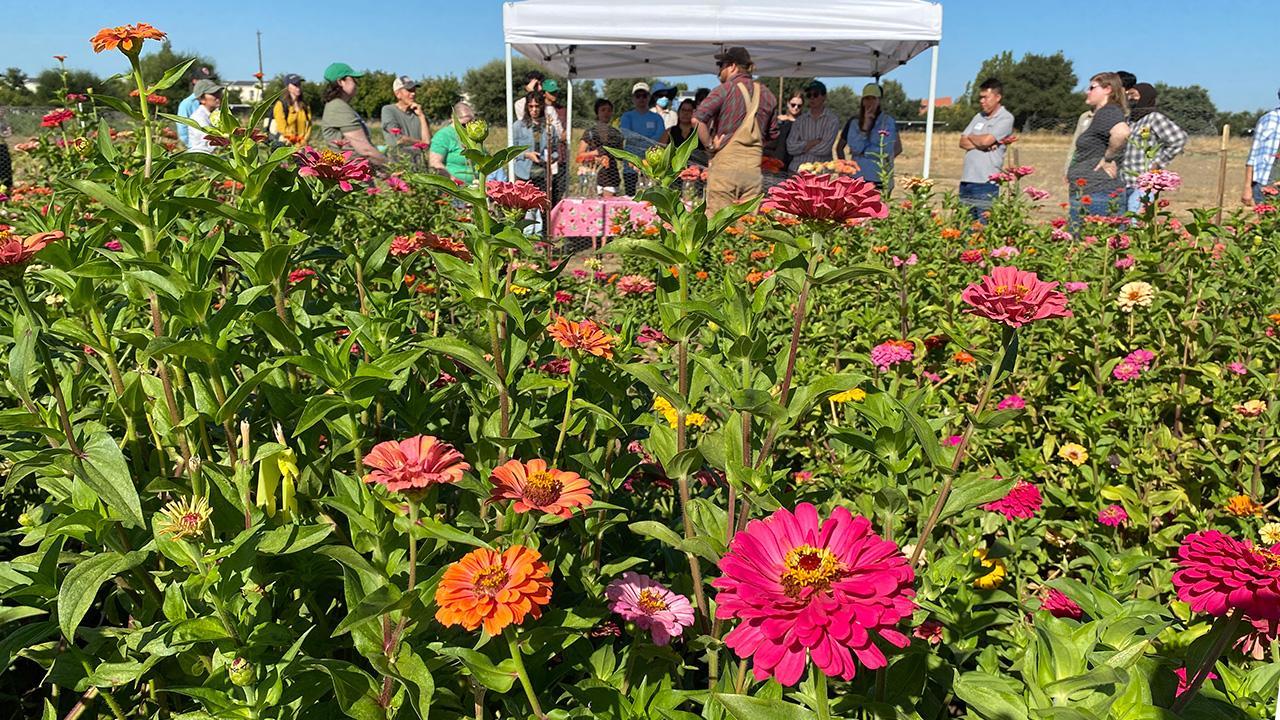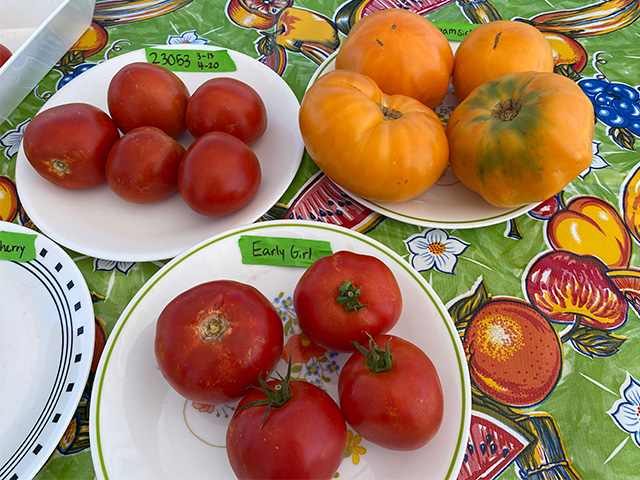
Celtuce, blue wheat, orange tomatoes and more draw crowd to SCOPE Field Day
Like it? Collaborators wanted for on-farm trials
Luscious zinnias, spectacular tomatoes and blue stone-ground wheat were among the organically grown produce on display during the 2023 SCOPE Field Day at the Student Farm at UC Davis.

Celtuce was the newest and most unusual vegetable introduced at the event. It’s a type of lettuce prized in Asia for its long, thick, single stem which, when prepared, has a mild, nutty flavor. (You can eat the leaves, too.) It was chosen through a collaboration with farmers, chefs, farm advisors and researchers to pay homage to Asian-American culinary culture. SCOPE’s breeding project aims to expand the cultivars of celtuce available in the United States, said Laura Roser, assistant specialist and program co-coordinator.
Based at the UC Davis Student Farm, SCOPE gives students experience in using traditional breeding techniques to develop crops that meet the needs of organic farmers in California and beyond, said Charlie Brummer, a professor in the Department of Plant Sciences and director of the UC Davis Center for Plant Breeding.
Tempting tomatoes
Doctoral student Luis Salazar introduced ‘Orange Creamsicle,’ a new variety of tomato that grows large, sometimes delightfully odd-shaped, with a green blush at the shoulder. During the taste test, the new variety had a gorgeous, moist color when sliced, a firm texture when eaten and bright flavor, with a pleasing balance of acidity and sweetness. “‘Orange Creamsicle’ will likely be released in late 2024 or early 2025, after another year of trialing in summer 2024,” Salazar said.
Other tomato varieties also are being trialed, including a round, red-and-purple saladette tomato called ‘Charred Cherry.’ Developed by Cal Poly Pomona collaborators, it’s high-yielding and has a pleasing flavor, with moderate sweetness. ‘UC Rockin’ Roma’ is a roma-type tomato with good taste, balanced acidity and yields similar to Early Girl.
Blue wheat is a hit

SCOPE’s small grains team has been working with heritage and colored varieties, plus advanced breeding lines from the department’s wheat breeding program, to develop new strains. They’re aiming for wheat that will thrive in fields that get little inputs, such as compost, and no irrigation – typical of most wheat cultivation on organic farms.
Led by lead student breeder Savannah Pluma, the team recently spent a day at the nearby office of the California Wheat Commission, where they tried baking with a new variety of blue wheat. The results were presented during the field day: The crackers offered a rich, satisfying flavor, and the shortbread was downright delicious.
Zippy zinnias
Breathtaking colors and rich, new shapes being developed in zinnias were presented by doctoral student Will Hazzard.
Some flowers had half-circle petals in creamy tones arranged firmly around the center. Some had long, apricot-hued petals that feathered out in relaxed stretches. Some had puffy centers that invited a curious touch. Shades of soft yellow and pink and rust, punctuated by vivid magenta and violet, orange and blood red, delighted the eye. These textures have been developed over the past four years especially for florists and farmers’ markets, and stems are longer than commercial cultivars.

Hazzard’s personal favorite? From the field demonstration table, he pulled over a vase filled with ivory balls of buttery softness. “These are the stand-outs!” he opined, but a zippy name has yet to be selected: They’re currently called ZC.23.110. “Not the most glamorous,” Hazzard quipped.
New celtuce varieties coming
This Asian lettuce grown for its stems is being developed in partnership with the Second Generation Seeds Collective. One of the founders, Winters farmer Kristyn Leach, of Namu Farm, is working with SCOPE on trials. They are breeding new varieties to resist bolting, increase stem thickness, and find new flavors and leave shapes.
Call for collaborators
Farmers and seed producers are invited to partner with SCOPE for in-field trials or suggest new crops that would benefit California’s organic agriculture industry. To become part of the SCOPE network, contact co-coordinator Laura Roser at lcroser@ucdavis.edu.
The student-led SCOPE project stands for Student Collaborative Organic Plant Breeding Education. The Organic Research and Extension Initiative contributes to the program’s funding.

Media Resources
- Trina Kleist, UC Davis Department of Plant Sciences, tkleist@ucdavis.edu, (530) 754-6148 or (530) 601-6846
